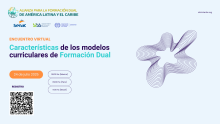Dual Training Curricula: Innovation, Relevance, and Connection to the World of Work
24 July 2025 – With over 300 participants from across Latin America, the third videoconference organised by the Alliance for Dual Training in Latin America and the Caribbean was held, under the pro tempore presidency of SENAC Brazil and with the technical secretariat of ILO/Cinterfor. The event focused on the characteristics of dual training curriculum models, featuring presentations from Mexico, Peru, and Germany.
National Models with Regional Identity
The session centred on sharing the experiences of three leading institutions in dual training:
CONALEP (Mexico), represented by Maritza Huitrón, presented its curriculum model which combines a national core with region-specific technical pathways. The presentation highlighted how the curriculum adapts to local demands of the productive sector through specialised modules and integrates socio-emotional skills based on a humanistic and constructivist approach.
SENATI (Peru), presented by Walter Rioja, showcased its competence-based model derived from occupational analysis in companies. The curriculum is structured in occupational and training modules, allowing for progressive certification and early entry into the labour market. SENATI emphasised the importance of close engagement with the productive sector in both curriculum design and validation.
BIBB (Germany), represented by Ilona Medrikat, explained the German dual training model, which includes federal training regulations and framework curricula for schools. Germany applies a key and cross-cutting competence approach—covering areas such as digitalisation, sustainability, and teamwork—developed through a collaborative process involving government, employers, and trade unions. The rigorous curriculum updating process ensures quality standards at the national level.
Convergences and Challenges
During the Q&A segment, topics discussed included the coordination between school-based education and workplace training, addressing regional demands within nationally standardised systems, and the ability of curricula to respond to rapid technological changes.
All countries agreed on the need for strong coordination with the productive sector and highlighted the importance of institutional mechanisms to ensure the quality, relevance, and continual updating of curricular content.
Towards a Shared Vision
This event is part of a broader series of activities promoted by the Alliance for Dual Training, which seeks to strengthen vocational training systems in Latin America and the Caribbean through the exchange of good practices.





